
WASTE MANAGEMENT & RESEARCH
Scope & Guideline
Driving excellence in waste management research and practice.
Introduction
Aims and Scopes
- Waste Minimization and Resource Recovery:
Research in this area focuses on strategies to minimize waste generation at source and enhance resource recovery from waste materials, promoting recycling and upcycling. - Circular Economy and Sustainability:
The journal emphasizes the transition towards a circular economy, exploring how waste management practices can be aligned with sustainable development goals and environmental protection. - Technological Innovations in Waste Management:
Studies often investigate new technologies for waste treatment, recycling, and energy recovery, including the use of artificial intelligence, machine learning, and advanced materials. - Policy and Regulatory Frameworks:
The journal explores the implications of various policies and regulations on waste management practices, assessing their effectiveness in promoting sustainable waste management. - Social and Behavioral Aspects of Waste Management:
Research often delves into the social dynamics influencing waste management practices, including public attitudes, behaviors, and community engagement.
Trending and Emerging
- Biowaste and Organic Waste Management:
Research on the management and valorization of biowaste is on the rise, emphasizing sustainable practices like composting and anaerobic digestion to enhance resource recovery. - Integration of Artificial Intelligence in Waste Management:
There is a growing trend towards leveraging AI and machine learning technologies for optimizing waste management processes, enhancing sorting efficiency, and predicting waste generation patterns. - Sustainable Practices in Construction and Demolition Waste:
Emerging studies focus on sustainable practices in the construction sector, particularly the recycling and reuse of construction and demolition waste, aligning with circular economy principles. - Behavioral Insights and Public Engagement:
Research increasingly explores the behavioral aspects of waste management, emphasizing how public perceptions and behaviors influence waste sorting, recycling, and overall management practices. - Impact of COVID-19 on Waste Management Practices:
The pandemic has prompted a surge in research examining the implications of COVID-19 on waste generation and management, particularly concerning healthcare waste and changes in consumer behavior.
Declining or Waning
- Traditional Waste Disposal Methods:
There is a noticeable decline in research focusing solely on traditional waste disposal methods, such as landfilling, as the emphasis shifts towards more sustainable and innovative approaches. - Single-use Plastics:
While still a concern, the urgency surrounding single-use plastics has somewhat diminished as research increasingly favors broader discussions on circular economy practices and comprehensive waste management strategies. - Generalized Waste Management Practices:
Research that lacks specificity or fails to address localized issues is becoming less prevalent, as the journal trends towards studies that provide detailed, context-specific solutions. - Incineration as a Primary Waste Management Technique:
The focus on incineration has waned as environmental concerns and the push for circular economy practices lead to more scrutiny and calls for alternative waste management solutions.
Similar Journals
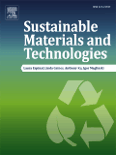
Sustainable Materials and Technologies
Exploring Innovative Paths to Material SustainabilitySustainable Materials and Technologies is an esteemed journal published by Elsevier, focusing on pioneering research and innovative solutions in the fields of industrial engineering, materials science, and environmental sustainability. With a prestigious Q1 ranking in multiple relevant categories—including Industrial and Manufacturing Engineering, Materials Science, Renewable Energy, Sustainability, and Waste Management—this journal is positioned as a leading platform for disseminating high-impact research that addresses pressing challenges in material sustainability. Recognized for its rigorous peer-review process and commitment to academic excellence, Sustainable Materials and Technologies is dedicated to providing open access to groundbreaking studies and practical methodologies that drive forward the agenda for a sustainable future. Since its inception in 2014, the journal has been integral for professionals, researchers, and students who are engaged in the quest for innovative materials and technologies that minimize ecological footprints. Join a community at the forefront of sustainability science by contributing to and engaging with the transformative research published in this pivotal journal.
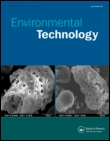
ENVIRONMENTAL TECHNOLOGY
Shaping Tomorrow’s Environmental Practices TodayENVIRONMENTAL TECHNOLOGY, published by Taylor & Francis Ltd, is a prominent journal that serves as a crucial platform for disseminating pioneering research in the multifaceted fields of Environmental Science, Water Science and Technology, and Waste Management. With an impressive record spanning over three decades from 1990 to 2024, the journal holds significant rankings in various categories, including Q3 in Environmental Chemistry and Q2 in both Medicine (miscellaneous) and Water Science and Technology for 2023. Its Scopus rankings further position it within the top tiers of Environmental Science disciplines, reflecting its influence and relevance, particularly as it pertains to pressing global environmental challenges. While the journal does not offer an open access option, it remains dedicated to advancing knowledge and promoting innovative solutions among researchers, professionals, and students engaged in environmental studies. As it continues to attract high-quality submissions, ENVIRONMENTAL TECHNOLOGY plays a vital role in shaping future research and practices aimed at sustainable environmental management.
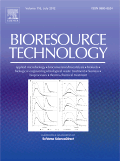
BIORESOURCE TECHNOLOGY
Elevating Research Standards for Environmental SustainabilityBioresource Technology, published by Elsevier Science Ltd, is a leading journal in the fields of bioengineering, environmental engineering, and sustainable resource management. With an impressive impact factor reflected in its Q1 rankings for 2023 across multiple relevant categories, it stands out as a premier source for groundbreaking research from its inception in 1991 to its anticipated contributions through 2024. Bioresource Technology promotes the advancement of technologies and methodologies aimed at the sustainable utilization of biological resources, playing a pivotal role in tackling the challenges of waste management, renewable energy, and environmental protection. Researchers and practitioners are encouraged to contribute and engage with high-quality studies that have significant implications for the global push towards sustainability and innovation. Although the journal does not currently offer Open Access, its subscription model ensures that the rigorous peer-reviewed content remains accessible to those dedicated to advancing the field.
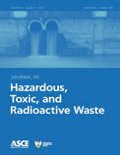
Journal of Hazardous Toxic and Radioactive Waste
Innovating research in waste management and remediation.The Journal of Hazardous Toxic and Radioactive Waste, published by the ASCE-American Society of Civil Engineers, serves as a pivotal platform for the dissemination of innovative research in the fields of civil and environmental engineering, focusing on the management and remediation of hazardous materials. With an ISSN of 2153-5493 and an E-ISSN of 2153-5515, this journal has established its reputable presence since its inception, converging years from 2011 to 2025. It operates within esteemed Category Quartiles, ranking Q2 in Chemical Engineering, Environmental Engineering, and several related fields, making it a valuable resource for researchers and practitioners alike. Though not open access, its rigorous peer-review process ensures high-quality and impactful findings, underscoring its significance in advancing knowledge on waste management, environmental chemistry, and public health concerns. As a critical resource for professionals dedicated to addressing the growing challenges associated with hazardous and radioactive waste, this journal invites contributions that push the boundaries of scientific inquiry and practical application.
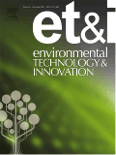
Environmental Technology & Innovation
Leading the Way in Eco-Innovation and Research ExcellenceEnvironmental Technology & Innovation is a leading academic journal published by Elsevier, focusing on groundbreaking research and advancements in the fields of Environmental Science, Plant Science, and Soil Science. Since its inception in 2014, this prestigious journal has established itself in the top Q1 quartiles of its categories, reflecting its commitment to publishing high-quality, impactful research. As evidenced by its impressive Scopus ranks, including a rank of #14/516 for Plant Science and #5/159 for Soil Science, it serves as a vital resource for scholars, researchers, and professionals aiming to advance their understanding and innovation in environmental technologies. Although it operates under a subscription model, the journal provides significant insights and access options, making it an essential addition to any researcher's library. With its emphasis on sustainability and technological advancements, Environmental Technology & Innovation remains at the forefront of addressing global environmental challenges and fostering innovative solutions.

REVIEWS IN ENVIRONMENTAL SCIENCE AND BIO-TECHNOLOGY
Exploring Innovations at the Intersection of Science and NatureREVIEWS IN ENVIRONMENTAL SCIENCE AND BIO-TECHNOLOGY is a leading academic journal published by Springer, focusing on the interdisciplinary study and advancement of environmental science and biotechnological applications. With an impressive impact factor that places it in the top quartile of its categories, this journal has consistently ranked highly (Q1) in vital fields such as Applied Microbiology and Biotechnology, Environmental Engineering, Pollution, and Waste Management and Disposal, reflecting its significant contribution to these domains. Established in 2002 and continuing to publish cutting-edge research, the journal primarily caters to researchers, professionals, and students who seek to stay abreast of the latest findings and methodologies in environmental sustainability and biotechnological innovations. While it does not currently offer open-access options, subscribers have access to a wealth of comprehensive reviews and original articles that explore the ever-evolving challenges and solutions in environmental science. Located in the Netherlands, REVIEWS IN ENVIRONMENTAL SCIENCE AND BIO-TECHNOLOGY is instrumental in bridging the gap between scientific research and practical application, promoting a collaborative approach to addressing global environmental issues.
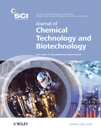
JOURNAL OF CHEMICAL TECHNOLOGY AND BIOTECHNOLOGY
Pioneering Research at the Intersection of Science and TechnologyJOURNAL OF CHEMICAL TECHNOLOGY AND BIOTECHNOLOGY, published by WILEY in the United Kingdom, serves as a premier platform for research at the interface of chemical engineering and biotechnology. With an ISSN of 0268-2575 and E-ISSN 1097-4660, this journal has established itself as a crucial resource for scholars and professionals, evidenced by its impactful categorization in the Q1 and Q2 quartiles across multiple domains such as Inorganic Chemistry, Biotechnology, and Renewable Energy. The journal encompasses a broad scope that includes innovative research on sustainable technologies, pollution management, and advances in chemical syntheses, making it essential for those pursuing cutting-edge developments in these disciplines. Researchers and practitioners benefit from its comprehensive coverage, as it includes insightful articles, reviews, and case studies that collectively push the boundaries of contemporary science and engineering. With a ranking of Q2 in its various categories and significant percentiles in key fields, the journal stands as a beacon for high-quality scholarship, eligible for impact in both academia and industry.

Resources Conservation & Recycling Advances
Advancing sustainability through innovative research.Welcome to Resources Conservation & Recycling Advances, an influential open-access journal published by Elsevier since its inception in 2021. With an ISSN of 2667-3789, this journal serves as a vital platform for disseminating cutting-edge research in the fields of economics, waste management, and environmental science. Recognized for its high impact, it proudly holds a Q1 ranking in both Economics and Econometrics as well as Waste Management and Disposal, highlighting its significance within these critical categories. The journal aims to advance understanding and innovation in resource conservation and recycling practices, making it an essential resource for researchers, professionals, and students dedicated to sustainability. With its current Scopus rankings placing it in the top percentiles—34th out of 716 in Economics and Econometrics and 21st out of 134 in Waste Management—Resources Conservation & Recycling Advances continues to contribute to meaningful discussions and developments in the pursuit of a more sustainable future.

Detritus
Bridging research and practice in environmental science.Detritus, an esteemed open-access journal published by CISA PUBLISHER since 2018, serves as a vital platform for the dissemination of innovative research in the fields of Environmental Chemistry, Environmental Engineering, and Waste Management and Disposal. Based in Padova, Italy, the journal aims to foster scholarly communication and collaboration among researchers, professionals, and students dedicated to advancing our understanding of environmental challenges and solutions. With its open-access model, Detritus ensures that high-quality research is freely available, bridging the information gap within the scientific community. While currently categorized in the Q3 quartile across multiple environmental science disciplines, the journal is poised to further enhance its visibility and impact, contributing significantly to pressing global issues such as waste reduction and sustainable resource management. As the journal continues to evolve, it encourages submissions that advance theory and application in these critical areas.

Journal of Material Cycles and Waste Management
Pioneering Sustainable Practices in Waste ManagementThe Journal of Material Cycles and Waste Management, published by Springer, stands as a pivotal resource in the fields of material cycles and waste management, addressing critical challenges related to the sustainability of materials and the efficient disposal of waste. With an impact factor reflective of its significant contribution to the scientific community, this journal publishes innovative research that spans a diverse range of topics, from recycling technologies to lifecycle assessment. The journal ranks in the Q2 category for both Mechanics of Materials and Waste Management and Disposal, highlighting its respected position in academia. Operating without open access, the journal seeks to engage researchers, professionals, and students alike, providing a platform to advance knowledge and foster collaboration in the pursuit of sustainable material management solutions. Located in Japan and adhering to a high standard of editorial excellence, the journal is a must-read for those invested in optimizing resource use and minimizing environmental impacts.